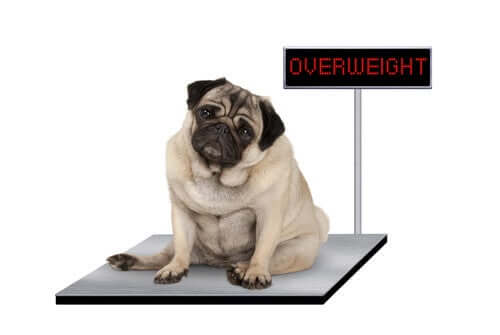High-protein Dog Food: Is It Good for Every Dog?


Written and verified by the biologist Ana Díaz Maqueda
High-protein dog food has been specially formulated for dogs with specific nutritional requirements. However, it’s important to distinguish between grain-free food on the one hand and specifically formulated high-protein foods.
A dog’s nutritional requirements can vary depending on a number of different factors. These can include their age or stage of life, breed, weight, the amount of physical activity they get, and any possible medical conditions they may suffer from.
So, what sort of dog is high-protein dog food made for? We’ll tell you all below!
What is high-protein dog food?
Dogs are elective carnivores and their main energy source comes from meat. However, not all the components of a dog’s diet contain the same amount of proteins. As a result, the concentration of proteins can vary, whether you’re feeding your dog a BARF diet or a conventional diet with dog food or canned food.
High-protein dog food is food that contains at least 30% protein. This type of food is aimed at dogs with specific conditions or lifestyles, such as:
- Working dogs (police dogs, rescue dogs, etc.)
- Sporting dogs
- Breeds or crossbreeds with high muscle mass
- Obese dogs

Even if your dog doesn’t fall into one of these categories, that doesn’t mean that you can’t feed him a high-protein diet. It’s still the most appropriate one for a carnivorous animal.
Benefits of high-protein dog food
Foods with a high concentration of proteins help the aforementioned types of dogs stay healthy. Protein is the foundation of a dog’s diet and a deficit can lead to nutritional deficiencies that in turn can lead to medical problems.
Some of the benefits of high-protein dog food are:
- Easy to digest. A dog’s digestive system is designed to process meat. This kind of food is best for their digestion and intestinal health.
- Improves bacterial flora. The microorganisms that live in an animal’s intestines are essential for their good health.
- Maintains muscle strength and prevents muscle deterioration in very active dogs.
- Despite what many believe, protein-rich foods don’t increase the risk of kidney disease, nor do they make it worse if they already have it. A more serious problem for this condition is the consumption of highly-processed, low-quality foods. These have a negative impact on the dog’s health.
- A diet rich in protein and low in carbohydrates (which is difficult for dogs to digest), helps weight loss for dogs with obesity.

Are all proteins the same?
If you’re thinking of feeding your dog a high-protein diet, it’s important to understand that not all proteins have the same biological value.
A protein’s biological value is established according to how easily it is incorporated into existing proteins in the body, in other words, how easy it is to absorb.
In order for your dog to get the most out of a high-protein diet, it’s important to pay attention to the source of the protein and how it has been processed. Even if the dog food has been formulated using good-quality meat, the extrusion process can reduce the overall quality.
On the other hand, proteins from vegetables, such as soybeans, are not a good option for your dog. The best proteins for your dog are those from fresh foods and foods that have had very little or no processing.
High-protein dog food has been specially formulated for dogs with specific nutritional requirements. However, it’s important to distinguish between grain-free food on the one hand and specifically formulated high-protein foods.
A dog’s nutritional requirements can vary depending on a number of different factors. These can include their age or stage of life, breed, weight, the amount of physical activity they get, and any possible medical conditions they may suffer from.
So, what sort of dog is high-protein dog food made for? We’ll tell you all below!
What is high-protein dog food?
Dogs are elective carnivores and their main energy source comes from meat. However, not all the components of a dog’s diet contain the same amount of proteins. As a result, the concentration of proteins can vary, whether you’re feeding your dog a BARF diet or a conventional diet with dog food or canned food.
High-protein dog food is food that contains at least 30% protein. This type of food is aimed at dogs with specific conditions or lifestyles, such as:
- Working dogs (police dogs, rescue dogs, etc.)
- Sporting dogs
- Breeds or crossbreeds with high muscle mass
- Obese dogs

Even if your dog doesn’t fall into one of these categories, that doesn’t mean that you can’t feed him a high-protein diet. It’s still the most appropriate one for a carnivorous animal.
Benefits of high-protein dog food
Foods with a high concentration of proteins help the aforementioned types of dogs stay healthy. Protein is the foundation of a dog’s diet and a deficit can lead to nutritional deficiencies that in turn can lead to medical problems.
Some of the benefits of high-protein dog food are:
- Easy to digest. A dog’s digestive system is designed to process meat. This kind of food is best for their digestion and intestinal health.
- Improves bacterial flora. The microorganisms that live in an animal’s intestines are essential for their good health.
- Maintains muscle strength and prevents muscle deterioration in very active dogs.
- Despite what many believe, protein-rich foods don’t increase the risk of kidney disease, nor do they make it worse if they already have it. A more serious problem for this condition is the consumption of highly-processed, low-quality foods. These have a negative impact on the dog’s health.
- A diet rich in protein and low in carbohydrates (which is difficult for dogs to digest), helps weight loss for dogs with obesity.

Are all proteins the same?
If you’re thinking of feeding your dog a high-protein diet, it’s important to understand that not all proteins have the same biological value.
A protein’s biological value is established according to how easily it is incorporated into existing proteins in the body, in other words, how easy it is to absorb.
In order for your dog to get the most out of a high-protein diet, it’s important to pay attention to the source of the protein and how it has been processed. Even if the dog food has been formulated using good-quality meat, the extrusion process can reduce the overall quality.
On the other hand, proteins from vegetables, such as soybeans, are not a good option for your dog. The best proteins for your dog are those from fresh foods and foods that have had very little or no processing.
All cited sources were thoroughly reviewed by our team to ensure their quality, reliability, currency, and validity. The bibliography of this article was considered reliable and of academic or scientific accuracy.
- Blanchard, G., Nguyen, P., Gayet, C., Leriche, I., Siliart, B., & Paragon, B. M. (2004). Rapid weight loss with a high-protein low-energy diet allows the recovery of ideal body composition and insulin sensitivity in obese dogs. The Journal of nutrition, 134(8), 2148S-2150S.
- Hang, I., Rinttila, T., Zentek, J., Kettunen, A., Alaja, S., Apajalahti, J., … & Spillmann, T. (2012). Effect of high contents of dietary animal-derived protein or carbohydrates on canine faecal microbiota. BMC veterinary research, 8(1), 90.
- Hirakawa, C., & Daristotle, C. (2001). Nutrición Canina y Felina.
- Laflamme, D. P. (2008). Pet food safety: dietary protein. Topics in companion animal medicine, 23(3), 154-157.
- Robertson, J. L., Goldschmidt, M., Kronfeld, D. S., Tomaszewski, J. E., Hill, G. S., & Bovee, K. C. (1986). Long-term renal responses to high dietary protein in dogs with 75% nephrectomy. Kidney international, 29(2), 511-519.
This text is provided for informational purposes only and does not replace consultation with a professional. If in doubt, consult your specialist.








